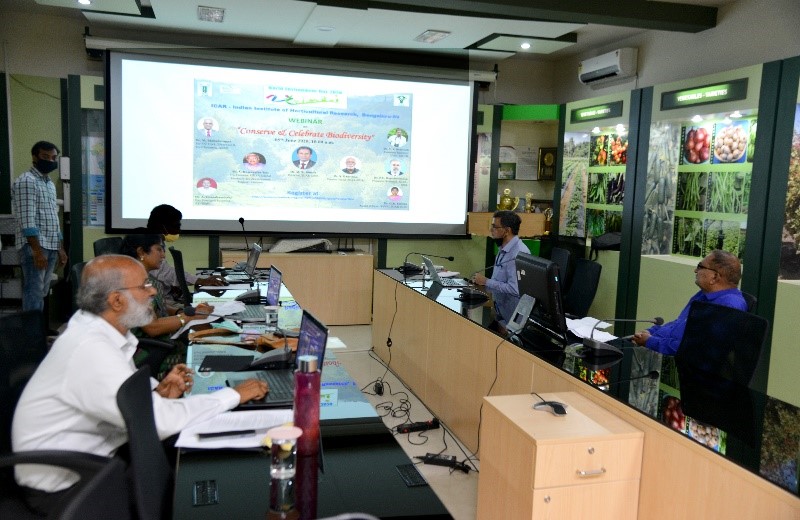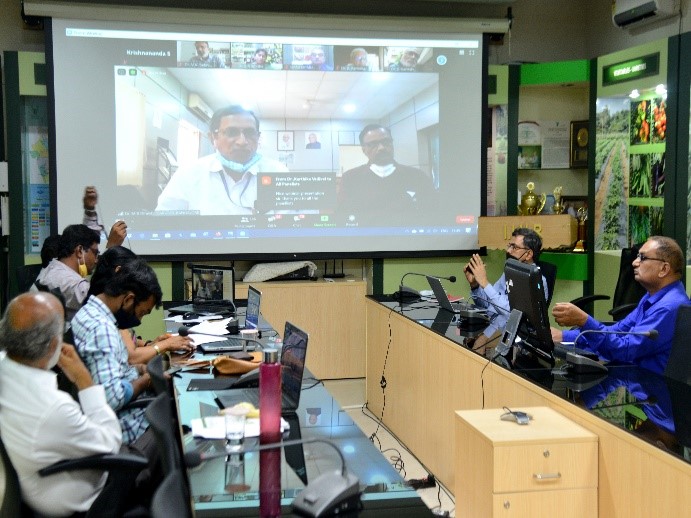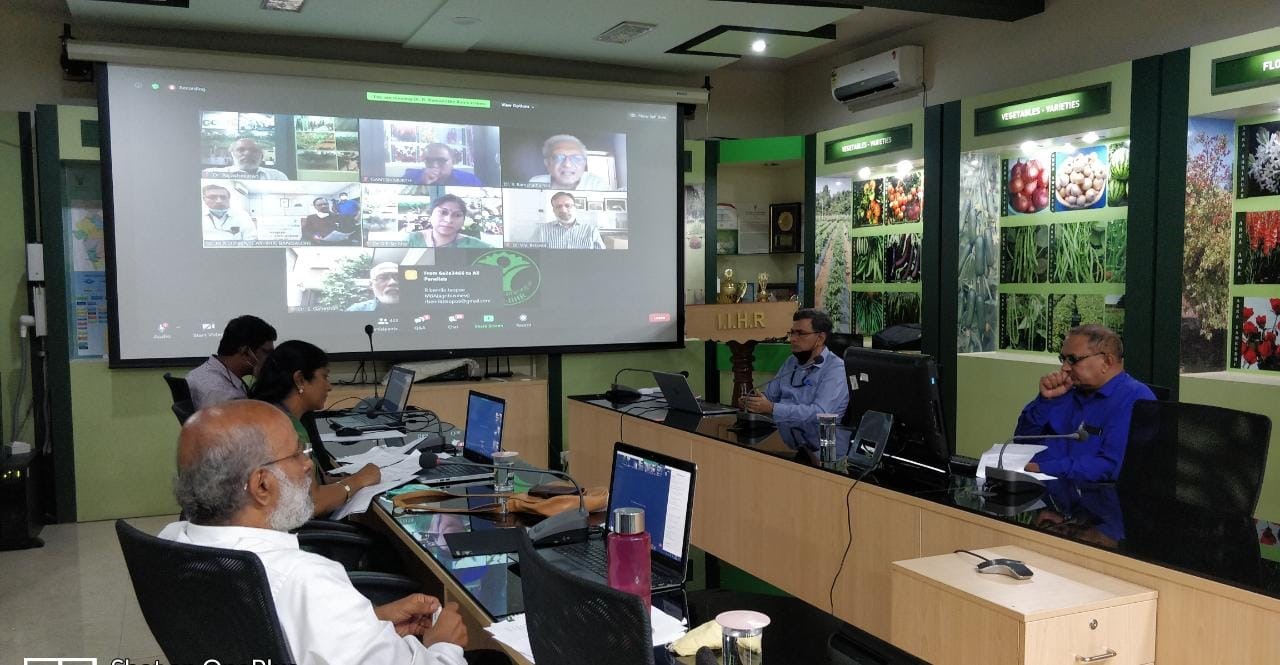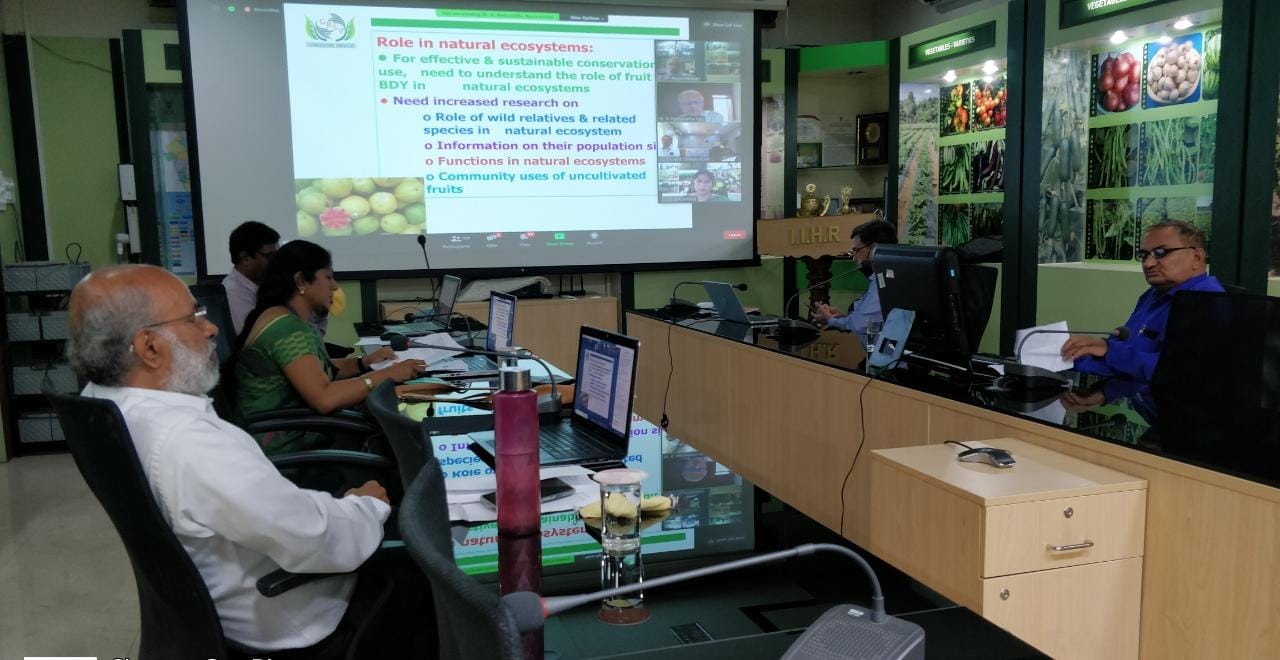
A Webinar on “Conserve & Celebrate Biodiversity" was organized at ICAR - Indian Institute of Horticultural Research, to celebrate World Environment Day on 05th June 2020 at 10.00 a.m. this years theme was 'Time for Nature,' with a focus on its role in providing the essential infrastructure that supports life on Earth and human development. Experts from different fields of biodiversity were the panelists and they made deliberations on various aspects of biodiversity. It was attended by more than 425 participants from staff of ICAR-IIHR and ICAR Institutes, students and staff from different agricultural and traditional universities and general public.
Dr. G.R. Smitha, Nodal Officer of Sports and Staff Welfare Committee welcomed the panelists and participants and emphasized about the relevance of celebration of World Environment Day. Its main aim is to take positive environmental action, protect nature and the planet Earth. Since 1974, it has been celebrated every year on 5th June: engaging governments, businesses, celebrities and citizens to focus their efforts on a pressing environmental issue. This year, the theme is biodiversity – a concern that is both urgent and existential. Biodiversity is the foundation that supports all life on land and below water. It affects every aspect of human health, providing clean air and water, nutritious foods, scientific understanding and medicine sources, natural disease resistance and climate change mitigation.
The webinar started with the presentation by Dr. P.E. Rajashekharan, Principal Scientist, on "Importance of conservation and Biodiversity - the backbone of Agriculture". He explained about the importance of genetic diversity of different agricultural and horticultural crops, its conservation strategies, climate change and its relation with pandemics related to and ways to address these challenges. He made a point on changing from ex situ to on farm in situ conservation in case of agro-biodiversity. He also emphasized the importance of conservation of wild relatives for imparting biotic and abiotic stresses; agricultural Biodiversity for nourishing people and sustaining the planet. He expressed concern over of genetic erosion and loss of biodiversity
Dr. R. Ramanatha Rao, Co-Founder, GRSV Global Research-for-development Support Ventures made his deliberations on "Tree Fruit Diversity - India’s goldmine". He highlighted about the fruit biodiversity and how it is contributing towards the nutrition, economy and sustainability. He emphasized on the role of custodian farmers in conserving the diversity on farm with the example of the successful UNEP GEF project on tropical fruit crops. Although fruits have always been important agricultural species, it is only in recent years that there is an increasing awareness of the potential of native tropical fruit species as good sources of dietary vitamins, minerals and energy. They also play a very significant role for the wellbeing of the people through enhancing household income, employment generation for rural youth, women, and environmental protection. The successful conservation is achieved through custodian farmers in the case of fruit crops.
Dr. A.N. Ganeshamurthy, Former Principal Scientist and Head, Division of Soil Science and Agricultural Chemistry, ICAR-IIHR, Bengaluru spoke on the topic "Soil diversity & C sequestration". He covered various aspects viz., physical, chemical and biological components of soil and the importance of soil biodiversity. He also explained how these components are playing an immense role in carbon sequestration. He also gave simple ways and means to improve the carbon content of the soil like use of organic mulches, avoiding burning of on farm wastes etc.
Dr. V.V. Belavadi, Emeritus Scientist, Department of Entomology, University of Agricultural Sciences, GKVK, Bengaluru highlighted the vital role of pollinators in agriculture for increasing productivity, ecological services, food security and nutritional security. He also explained different species of pollinators involved in pollination of different agricultural and horticultural crops. He expressed his concern pollinators services are valued by the human community and showed the method to estimate the value for the pollination services we receive from pollinators by giving example of Cardamom and Pigeon pea crops.
Dr. S. Ganeshan, Former Principal Scientist and Head, Division of PGR, ICAR-IIHR, Bengaluru stressed about the need for cryopreservation, ways and means and future prospects of cryopreservation. With two case studies one from ICAR - IIHR and the other from Jawaharlal Nehru Tropical Botanical Garden Research Institute, Thiruvanathapuram, Kerala he explained the importance of conservation. He also emphasized the importance of integrating conservation to achieve maximum diversity among different crops.
After, the presentation there was an interaction session, wherein the participants queries were clarified by the expert panelists. The queries raised by the participants in Q&A section of the video conferencing was also answered by the expert panelists.
Dr. M.R. Dinesh, Director, ICAR-IIHR in his concluding remarks emphasized the need for conservation in agricultural and horticultural crops. He explained ICAR-IIHR's role and activities in collection and conservation of germplasm in various horticultural crops. He also made a mention on three jack fruit varieties which were collected from the farmers' filed and how ICAR-IIHR popularized the same. He also mentioned the success story of UNEP GEF project and emphasized the need of conducting diversity fair in different horticultural crops for popularizing the same. Further, he stressed the conservation of native germplasm of horticultural crops.
Finally, the webinar ended with vote of thanks proposed by Dr. Dr. T.S. Aghora, Nodal Officer, PME, ICAR-IIHR.



